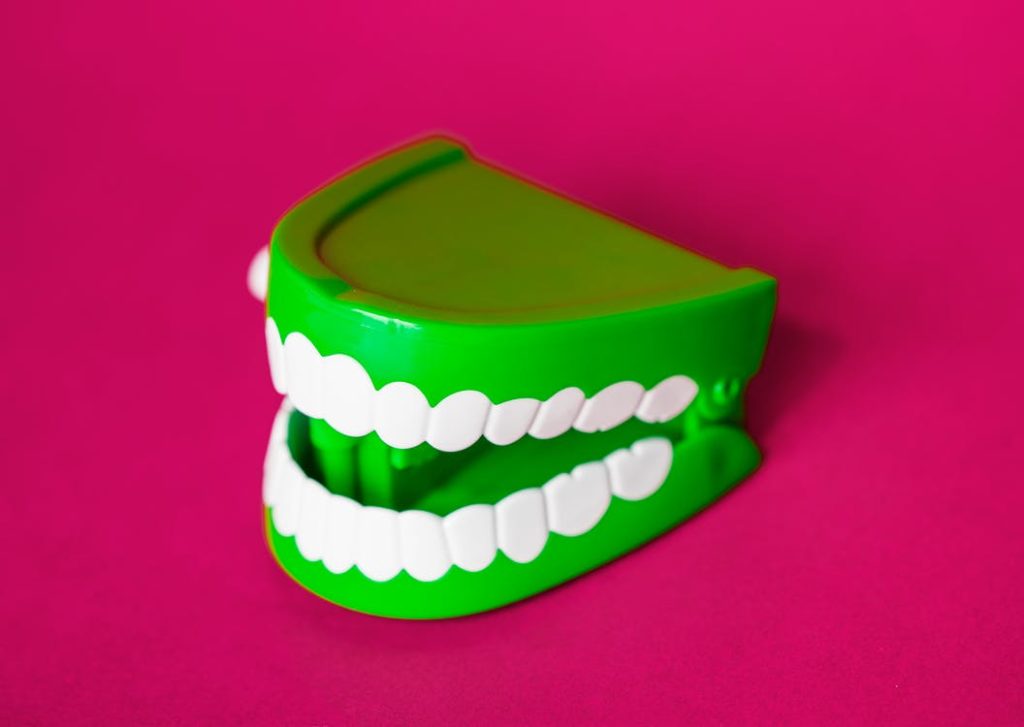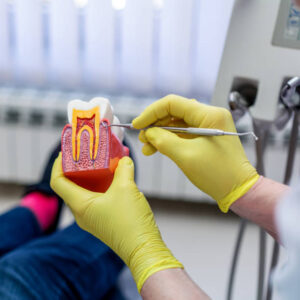On the other hand, there are some less obvious signs of a root canal infection that only experienced dentists can identify.
 Let’s take a toothache, for example. Even though it can be a telltale sign of many dental problems, tooth pain doesn’t always mean your tooth needs a root canal. It is very important to get familiar with symptoms and warnings signs of root canal infection.
Let’s take a toothache, for example. Even though it can be a telltale sign of many dental problems, tooth pain doesn’t always mean your tooth needs a root canal. It is very important to get familiar with symptoms and warnings signs of root canal infection.
That can help you act in a timely manner and prevent future damage.
What Is a Root Canal?
First things first, let’s see what root canal is. This term refers to two things. It can appertain to the dental procedure whereby the infected material is removed and toothache is relieved. But it can also relate to the inner part of the tooth that is between the tooth root and pulp.
Each root canal contains blood vessels and nerves. Blood vessels deliver various nutrients to both nerves and teeth. As for the tooth’s nerves, they have the ability to sense different influencing factors like pressure, heat, and cold.
In the event of severe pulp infection and tooth decay, root canal treatment may include nerve removal as a necessary stage of the dental procedure.
What Are the Signs and Symptoms of Infected Root Canals?
As stated above, determining if a tooth requires root canal treatment is often a tricky task. Only qualified, highly experienced dentists can decide on the necessity of a procedure that involves root canal by use of professional methods.
Most Common Root Canal Infection Symptoms
Teeth Pain
Infected root canals cause acute pain as the inner tooth material is extremely sensitive. In some cases, the root canal infection has a tendency to thrive and give rise to a dental abscess. The tooth pain becomes unbearable and it must be treated promptly. Not all kinds of tooth pain are associated with a root canal, though.
Just because you are experiencing strong tooth pain, that doesn’t mean that you need a root canal therapy. Sometimes the tooth that requires a root canal doesn’t hurt at all.
Furthermore, tooth pain can be caused by other dental conditions, such as tooth decay, exposed dentin, periodontal disease, sinus infection, bruxism, and tooth fracture.
 The key is to determine the location, onset, duration, and character of the pain. It’s critical to determine if the pain is dull or sharp and intense. The underlying condition can exist for weeks or even months, causing some kind of ache or discomfort.
The key is to determine the location, onset, duration, and character of the pain. It’s critical to determine if the pain is dull or sharp and intense. The underlying condition can exist for weeks or even months, causing some kind of ache or discomfort.
While most patients are capable of identifying which tooth actually hurts, the pain can be nondescript and vague in some cases.
The following are types of pain that often indicate a root canal infection:
- Severe tooth pain when chewing;
- Pain that is so strong that you can’t sleep at night.
- A pain that occurs when you’re putting pressure on the infected tooth;
- Thermal stimuli pain – for instance, it may happen when you drink cold water right after a hot beverage, or vice versa;
- A spontaneous pain that is either intermittent or continuous;
- A lingering toothache;
- A pulsing toothache.
Gum Tenderness and Swelling
Swelling is another associated symptom. It comes in different types and forms. In some cases, it can look normal and is accompanied by gum tenderness. Other times there is a big lump you can easily see or feel. The swelling sometimes expands to the neck or face in extreme cases.
It often goes hand in hand with a toothache. Similar to tooth pain, the swelling doesn’t always indicate the infected root canals. This makes it difficult to determine the necessity of root canal surgery.
Here are some swelling symptoms that may point to root canal infections:
- Swelling that lasts for a long period of time;
- A gum pimple-like boil situated in front of or on the root tip;
- The tooth that feels a bit taller than adjacent teeth;
- A recurring pimple that forms on the gums;
- Pronounced swelling.
Bad Breath and Acute Apical Abscess
Bacteria can cause various unpleasant-smelling infections, including infection of the root canal. If the tooth enamel gets damaged from an erosion, cavity, or trauma, bad bacteria can easily find their way into a root canal and start multiplying in the pulp chamber, emitting a foul odour.
 The pus can be another source of bad taste or odour in your mouth, especially when draining and venting off. Dental infection can bring about pus-filled pockets known as abscesses.
The pus can be another source of bad taste or odour in your mouth, especially when draining and venting off. Dental infection can bring about pus-filled pockets known as abscesses.
At first, it occurs as a small bump that is typically swollen and tender. It tends to get bigger as time goes on. Once an abscess forms, you will have a hard time dealing with it.
That’s because the infection of your root canal has already spread. So, be sure to act quickly if you notice any bulge underneath your gum.
Tooth Discoloration
An individually darkened tooth that develops a dark yellow, blue or gray tone can be a sign of root canal infection. Luckily, such a tooth can be noticed with ease. It as a dark shade compared to the rest of teeth. The tooth changes colour because of the limited blood flow.
Tooth discoloration generally indicates pathological changes that take place in the nerve area. A dark-coloured tooth frequently means that your tooth nerve is badly infected.
As the infection spreads, the nerve gets weak and dies eventually. The dead nerve must be treated as soon as possible. Otherwise, it’s going to harbour bacteria that cause a variety of oral problems.
Final Thoughts
The human body can fight off oral infections very effectively. But there is no way in which it gets antibodies deep inside a tooth. This is where the dentist comes in.
If you are experiencing any of the aforementioned symptoms, be sure to contact your dentist immediately. Do not ignore these signs. Your problems will just get worse. It’s important to receive prompt and proper professional treatment. Not only will the root canal treatment eliminate your pain, but it will also get your tooth in good condition.
Updated for 2022





